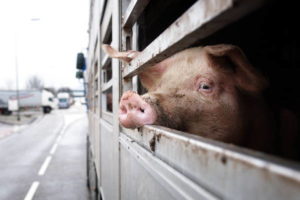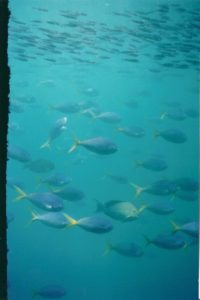Worldlog 17 aprile 2017
‘Finche’ ci siano macellazioni, vi saranno campi di battaglia.’ Un detto storico di Tolstoj, lo scrittore e filosofo russo. Ancora oggi un detto molto attuale. Alla fine di marzo sono state rese pubbliche le immagini controversiali dell’organizzazione di benessere degli animali Animal rights (Diritti di animali), mostrando una macellazione nella citta’ belga tielt. Questa macellazione non rispetta nessuna delle regole per il benessere degli animali ne la sicurezza del cibo.
Colpisce, ma non sorprende. Sapendo che nei Paesi Bassi vengono macellati 650 maiali all’ora e gli ispettori non hanno nemmeno cinque secondi per controllare il maiale, sono grandi anche le preoccupazioni sulle macellazioni olandesi. Per questo motivo abbiamo chiesto nella Camera di introdurre un obbligo di videosorveglianza nelle macellazioni. Ed abbiamo avuto successo! La nostra proposta e’ stata accettata con una grande maggioranza. E’ un passo importante verso piu’ trasparanza. Cosi’ il settore prendera’ piu’ sul serio il benessere degli animali e i consumatori guarderanno con piu’ scrupulo la carne sul loro piatto. Per usare le parole di Paul McCartney: ‘se le macellazioni avessere dei muri di vetro, sarebbero tutti quanti vegetariani’.

Vi sono state delle brutte notizie anche sul nostro mondo sottomarino. Il corallo nella zona Caraiba e’ a rischio di estinzione entro 15 anni come anche grandi parti dell’australiano Great Barrier Reef siano stati colpiti a causa dello scaldamento dell’acqua marina. Per salvare il corallo dobbiamo tutti quanti emettere molto meno CO2 e dobbiamo farlo in fretta. Per fortuna in Europa gia’ molti paesi hanno ridotto di molto le loro emissioni. Soprattutto la Gran Bretagna ha raggiunto una buona riduzione del 30 percento, grazie anche all’introduzione di tasse sulla CO2. E’ uno strumento efficace che il Partito per gli Animali supporta.
Comunque la riduzione deve raddoppiarsi in Europa per poter raggiungere gli obiettivi di Parigi. E i Paesi Bassi – dove l’emissione del CO2 e’ addirittura aumentato fino al livello piu’ alto mai raggiunto prima – deve ancora fare dei passi molto piu’ grandi.

Questi passi possono essere fatti soltanto se i governi si distanziano dal distruttivo mantra di crescita, crescita, crescita. E se invece cominciano ad utilizzare un sistema economico che consideri la capacita’ della terra e della societa’. Un sistema dove siamo piu’ che solo lavoratori, consumatori e possessori di capitali. Kate Raworth dell’ Oxford University’s Environmental Change Institute ha inventato un tale modello economico: The Doughnut. Leggete qui un interessanto articolo sull’argomento.
Bei risultati nelle elezioni comunali in Finlandia. Raggiunto tanti voti. Purtroppo non abbastanza per avere un seggio in uno dei sei comuni partecipanti. Ma come diceva il nostro partito fratello finlandese ‘Con la piccola squadra e il piccolo budget che abbiamo, siamo molto felici del risultato raggiunto’.
A presto. Cordiali saluti,
Marianne
‘As long as there are slaughterhouses there will always be battlefields.’ A historic quote by Tolstoj, the Russian writer, philosopher and political thinker. At the same time, it is still a topical quote. At the end of March, some highly confronting undercover images taken by the animal welfare organisation Animal Rights were published, which showed that almost all rules and regulations for animal welfare and food safety were structurally violated in a slaughterhouse in Tielt in Belgium.
Shocking, but not surprising. Knowing that 650 pigs are slaughtered every hour in the Netherlands and that inspectors get not even five seconds to check a pig causes also great concern about the treatment of animals in Dutch slaughterhouses. That is why we made a plea in the Lower House for mandatory CCTV in slaughterhouses. And we did so successfully. Our motion was adopted by a great majority. An important step towards more transparency, thus forcing the industry to take animal welfare more seriously and the consumer to be more conscious of the meat on his or her plate. And to quote Sir Paul McCartney: ‘If slaughterhouses had glass walls, everyone would be a vegetarian’.

There were shocking messages concerning our underwater world. The corals in the Caribbean are threatened to vanish within fifteen years and large parts of the Australian Great Barrier Reef are affected by severe bleaching due to the warming of seawater. To save the corals, we should all immediately reduce the emission of greenhouse gases into the atmosphere. Fortunately, many countries in Europe reduced their emissions considerably already. With Great Britain as a positive peak, which reached a reduction of 30 per cent, partly due to the introduction of its CO2 prices. An efficient instrument which is advocated by the Party for the Animals too.
Yet, greenhouses gases in Europe must be reduced twice as fast to meet the Paris climate goals. And the Netherlands – where the emission of greenhouse gases increased to the highest level ever! – still has to make great efforts.

Efforts that can only be achieved if the governments set aside their destructive mantra of growth, growth, growth. And change to an economic system that is based on the capacity of the earth and society. A system where we are more than just employees, consumers and owners of capital. Kate Raworth of Oxford University’s Environmental Change Institute thought up such new economic model: The Doughnut. Read here the interesting article about it.
Great results at the municipal elections in Finland. Many votes obtained. But unfortunately just not enough to obtain a municipal council seat in one of the six participating municipalities. But as our Finnish sister party pointed out ‘A great result with a small team and a small budget.’
Until soon. Kind regards,
Marianne